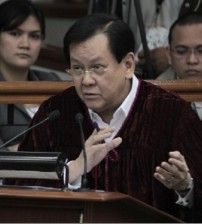MANILA, Philippines–Senators rebuffed the resolution of the Commission on Elections imposing a ban on cash withdrawals of more than P100,000 starting this Wednesday until May 13, with some saying it might be a violation of several laws.
“I am not sure of the legal issue. It might violate Bank Secrecy Act,” said Senator Sergio Osmena III, chairman of the Senate committee on banks, financial institutions and currencies, in a text message on Wednesday.
“The key question is whether the Comelec has the power to limit cash withdrawals,” Osmena said.
Senator Panfilo Lacson in a separate text message, said the resolution might also be a violation of the Anti-Money Laundering Act (AMLA).
“While laden with noble intentions, it may be violative of the Anti-Money Laundering law which provides for protection of candidates for public office from political prosecution and harassment during election period,” Lacson said.
“It specifically deals with a waiver on the threshold amount of P500,000 and against freezing of bank deposits. It is found on paragraph 2, Section 16 of Republic Act 9160. Subsequent amendments of the law have not changed this provision,” he pointed out.
The provision of the law that Lacson was referring to provides for the “prohibitions against political harassment.”
The said provision states that: “This Act shall not be used for political persecution or harassment or as an instrument to hamper competition in trade and commerce.”
“No case for money laundering may be filed against and no assets shall be frozen, attached or forfeited to the prejudice of a candidate for an electoral office during an election period,” it added.
Asked then if the candidates could now ignore the Comelec resolution, Lacson said: “It’s not the idea.”
But “between a Comelec resolution and the law passed and enacted by duly constituted authorities, the latter shall prevail,” he said.
“No issuances made by anybody can contravene the provisions of the law,” Lacson added.
Senate Majority Leader Vicente Sotto III criticized the Comelec for issuing such resolution, saying the poll body should have been “less swashbuckling” in its moves.
“Not everyone is involved or even interested in elections. I wish the Comelec was less swashbuckling in their moves.” Sotto said.
“It can be compared to a security guard given an area to man, he thinks it’s his kingdom,” he said.
Senator Ralp Recto described the Comelec resolution as “crazy” but did not elaborate.
Aside from cash withdrawals of more than P100,000, the Comelec resolution also banned the “possession, transportation and/or carrying of cash” worth more than P500,000.
For his part, Sen. Francis Pangilinan said: “If the poll body can disqualify nuisance candidates whom it believes are making a mockery of election laws, why not simply disqualify vote-buying candidates as a warning to the rest of unscrupulous politicians?
“What the Comelec should do is have roving checkpoints to arrest those engaged in vote buying which any law enforcer will easily spot if he or she is truly determined to enforce the law,” Pangilinan suggested in a solicited text message.
Once the culprits are positively identified, the Comelec can order its agents to swoop down on politicians engaged in vote-buying by using the cash given to voters as prima facie evidence.
“Vote buying in a sense is like illegal gambling. Ask anyone on the ground and they will tell you that it happens all the time. It takes place in broad daylight and can only happen when the Comelec and their deputized enforcers look the other way or are sleeping on the job,” the senator explained.
“Unless the Comelec actually disqualifies politicians engaged in vote buying before Election Day to make the exercise fraught with danger to an erring candidate, it will not go away. If the Comelec disqualifies just even 10 vote-buying politicians in summary proceedings prior to Election Day, it will be the most effective way to end the illegal practice. All the Comelec has to do is show the public that it is serious in going after botebuying politicians…otherwise the practice does not end,” he added. With a report from Cathy Yamsuan, Philippine Daily Inquirer
